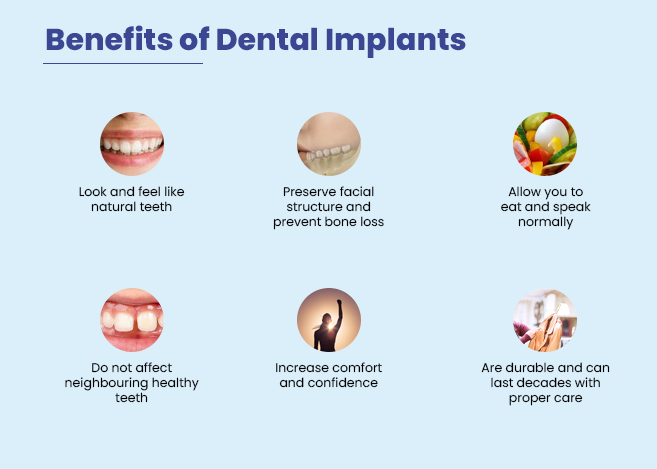Dental Implant Treatment Options for Missing Teeth


Missing teeth can turn even the brightest smiles into frowns. Whether you lost teeth due to injury, decay or periodontal disease, gaps in your smile can make you feel self-conscious. If you have missing teeth, dental implants are an excellent long-term solution.
But if you are not familiar with this term or want to know more about dental implants, you have arrived at the right place. Keep reading to learn all about the dental implant treatment process, options and how it can restore your smile.
What are Dental Implants?
Dental implants are artificial tooth roots used to replace missing teeth. They provide a sturdy base for fixed or removable replacement teeth that look and function like natural teeth. Dental implants are small titanium posts that are surgically inserted into your jawbone to serve as anchors for the replacement teeth. Once the jawbone fuses securely to the surface of the implants, replacement teeth are attached on top.
Benefits of Dental Implants
Dental implants offer many benefits over other tooth replacement options:


The Dental Implant Placement Process
Getting dental implants placed is a multi-step process that takes several months from start to finish.
- Initial consultation: The dentist will assess the health of your gums and jawbone using X-rays and scans. They will also discuss treatment options and what to expect.
- Implant surgery: The dentist will surgically insert the implant post(s) into the jawbone during an outpatient procedure. Local anaesthesia is used for comfort. Some temporary restorations may be inserted at this stage.
- Healing time: It takes 3-6 months for the jawbone to fuse securely to the implant surface during the osseointegration process. Temporary replacement teeth may be used during this period.
- Placement of the abutment: The abutment acts as the new artificial tooth root. Your dentist will attach an abutment to each implant after they have sufficiently healed.
- Creation of the dental crown: Your dentist will take impressions to create a customised replacement tooth (crown) that precisely fits the abutment and matches your natural teeth.
- Attachment of the crown: During your final appointment, your dentist will secure the custom-made crown onto the abutment. Your implant restoration is now complete!
Tooth Replacement Options
Replacing One Missing Tooth
If you have just one missing tooth, one implant topped with a crown can effectively replace it. This conservative approach allows you to keep the healthy neighbouring teeth intact. It also avoids the need for a dental bridge, which requires reducing healthy teeth on each side of the gap.
Replacing Multiple Missing Teeth
Multiple implant crowns or bridges can fill the wider gap if you are missing several adjacent teeth. Your dentist will determine the number of implants necessary based on the span and amount of missing bone. Using multiple implants provides excellent stability and support for longer spans of replacement teeth.
Full Mouth Implant Solutions
Patients who are missing all or most of their teeth can receive full dental implants. This involves placing 4-6 implants along the upper and/or lower jawbone to support a full arch of replacement teeth. The final implant-supported denture feels secure and allows patients to eat foods they have avoided for years with ease.
Care and Maintenance
Caring for your implants and replacement teeth involves diligent oral hygiene and regular dental checkups. For longevity, it’s important to:
- Brush twice daily
- Floss around the implant crowns daily
- Avoid very hard or sticky foods that could loosen crown attachments
- See your dentist every 6 months
- Get any implant issues addressed promptly
With conscientious home care and professional maintenance, dental implants and restorations can last for decades, giving you back the smile you deserve.
Conclusion
Dental implants can give you back the confident, carefree smile you deserve. With an innovative and pain-free dental implant treatment process, you can once again eat all your favourite foods and smile brightly without worry. Just think – well-placed implants could last thirty years or more with conscientious at-home care and regular dental checkups.
If you are looking for affordable dental implants in Chennai, go nowhere other than Radiant Dental Care. They have an expert team of dentists to give you the right treatment. Schedule a consultation and take the first step toward recovering your dental health. Your smile makeover could be complete in as little as a few months. You can Contact us at +91 9176166789 for booking an appointment.
FAQs
Do dental implants look and feel natural?
Yes, when properly placed by an experienced dentist, implants are designed to have the same shape, colour, and contour as your natural teeth. Advanced materials like zirconia and dental ceramics closely mimic real tooth structure’s look, function and feel.
How long do dental implants last?
With appropriate care and maintenance, implants can last several decades, often 30 years or longer. While implants have a high initial success rate, their longevity depends on keeping up with dental visits and caring well for your oral health.
Are dental implant procedures painful?
Any surgical procedure comes with some degree of discomfort. However, most patients report dental implant surgery causes minimal pain. Your dentist will use local anaesthesia to keep you comfortable during the procedure.
How long does dental implant treatment take?
Placing implants, integrating them with the jawbone, creating replacement teeth and attaching them can take 5 to 9 months. Getting implants requires careful planning and waiting periods to ensure proper healing between surgical phases. Be patient; the results are worth it.
Can the body reject dental implants?
In rare cases, the body may see a dental implant as a foreign object and reject osseointegration with the jawbone. This inflammatory response leads to implant failure. However, this occurs in only about 2–4% of implant recipients.


